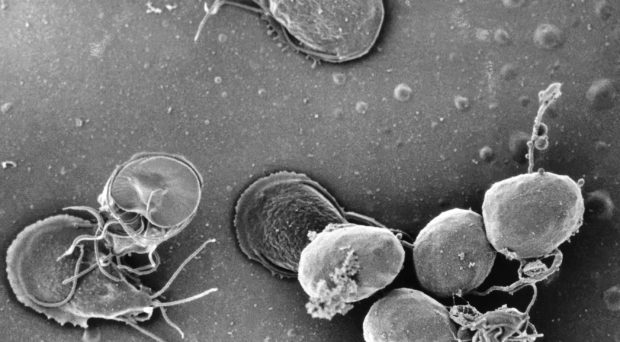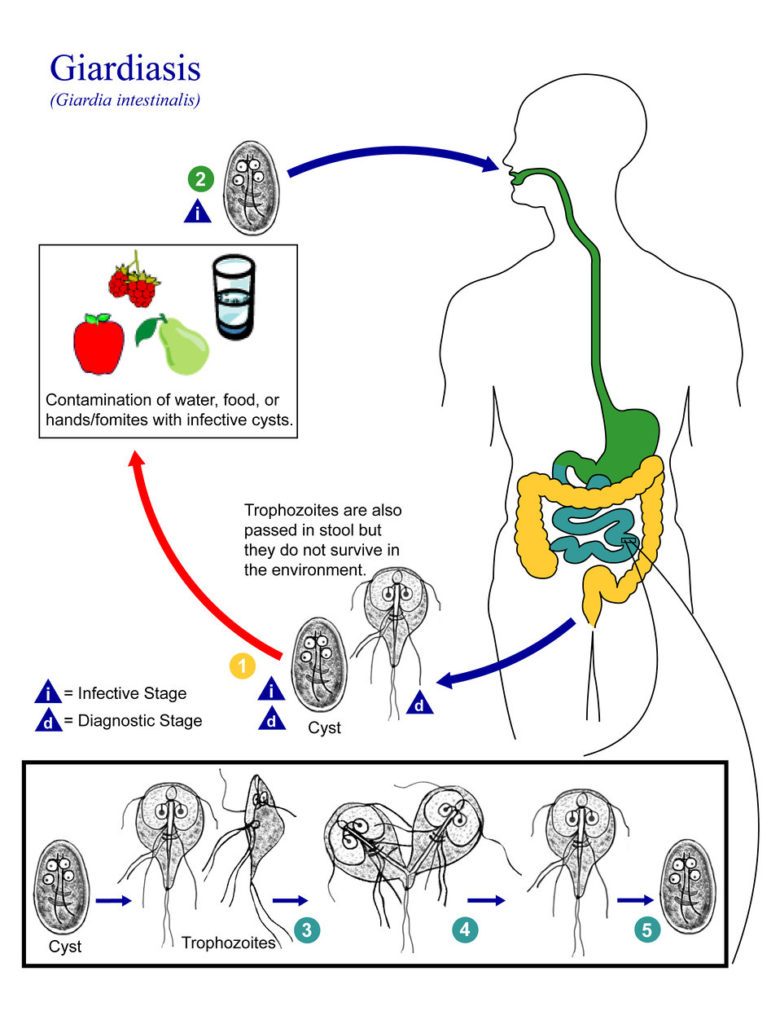Giardia, deworming, and WASH: a complex picture - BugBitten - BMC Blogs Network
Giardia, deworming, and WASH: a complex picture - BugBitten - BMC Blogs Network |
| Giardia, deworming, and WASH: a complex picture - BugBitten - BMC Blogs Network Posted: 06 Dec 2019 12:00 AM PST  Scanning electron micrograph (SEM) of an in vitro Giardia lamblia culture. (Picture by CDC/ Dr. Stan Erlandsen, from the Public Health Image Library) Giardiasis and intestinal worms: two neglected tropical diseasesGiardiasis, caused by the parasite Giardia duodenalis (also known as Giardia intestinalis or Giardia lamblia), has been associated with malnutrition and poor growth in young children. It is an infectious disease that can cause acute or chronic gastrointestinal symptoms. Soil-transmitted helminths, otherwise known as intestinal worms, can also contribute to impaired growth and development in children. Both Giardiasis and soil-transmitted heminths affect hundreds of millions of people worldwide. And both can be considered "neglected tropical diseases", which by their nature disproportionately affect people living in impoverished conditions, contributing to and perpetuating the poverty cycle. Complexities in controlIntestinal worm infections are usually controlled through large-scale deworming programs, in which deworming medications are delivered to at-risk populations in areas where the disease is endemic. Interestingly, the drugs delivered in these deworming programs can be used, in higher doses, to treat Giardia infections. However previously, only very little has been known about what happens to Giardia infections in the context of regular repeated deworming. New findings, recently published in Parasites & Vectors, showed that in communities in rural Timor-Leste, prevalence of Giardia infections did not change throughout 2 years of a community-wide deworming program, suggesting that the drugs are either not effective against Giardia at the doses used in deworming, or that reinfection with Giardia was happening very rapidly after treatment.  What about WASH?Water, sanitation and hygiene (WASH) is critical in the transmission of both Giardia and intestinal worms, because both are transmitted through exposure to human feces. However, reducing infections through WASH interventions in communities in low-income settings has proven to be challenging. Indeed, the findings of this new research showed that Giardia infections remained high despite a community-based WASH intervention, likely as a result of ongoing "open defecation" (defecation outdoors in the open environment) despite the intervention. The key factors driving transmission in the study population were exposure to young children, household crowding, seasonality (infections were more common in the rainy season), and co-infections with helminths, with hookworm infection appearing to be protective against Giardia infection. Where to from here?These new findings highlight that Giardia is an important parasite to consider in the context of large-scale deworming programs in low-income settings. Such programs may offer an opportunity for health workers to educate local communities about Giardia, how it is transmitted, and how to seek treatment. More research is needed to further investigate the relationship between Giardia and intestinal worm infections, and the impact of regular deworming on Giardia infections. Ongoing efforts are also needed within the WASH sector to develop innovative, sustainable, locally-tailored approaches to improve WASH conditions as a means to reducing parasitic diseases. Building on existing knowledge with ongoing, community-centred research will enable tailoring of control efforts to maximise benefits to the hundreds of millions of people infected by these neglected tropical diseases. |
| FDA Continues to Address Antiparasitic Resistance in Livestock and Horses - Jill Lopez Posted: 21 Dec 2019 11:15 AM PST The U.S. Food and Drug Administration continues to work with stakeholders to address antiparasitic resistance in livestock (cattle, sheep, goats, swine, and poultry) and horses. In an on-going effort to help maintain the effectiveness of approved antiparasitic drugs, the FDA has produced two videos on antiparasitic resistance; released the results of a survey of the U.S. veterinary community about antiparasitic drug use and antiparasitic resistance in grazing animals; and asked animal drug companies to add information about antiparasitic resistance to the labels of all approved antiparasitic drugs for livestock and horses. Parasite infections are a health and welfare concern for livestock and horses. Therefore, effective antiparasitic drugs are vital to the animal health industry in the U.S. However, parasites are becoming increasingly resistant to drugs that were generally effective against them in the past. In these situations, after an animal is treated with an antiparasitic drug, the susceptible parasites die and the resistant ones survive to pass on resistance genes to their offspring. Although antiparasitic resistance in animals doesn't directly affect the health of people in the U.S., it's a growing animal health threat in this country and can result in production losses in food-producing animals. Heavy parasite infections can cause diarrhea, weight loss, anemia (low level of red blood cells), and death in animals. Antiparasitic resistance also poses a significant threat to the sustained effectiveness of antiparasitic drugs. Science shows that antiparasitic resistance can't be stopped. Parasites will continue to evolve and develop resistance; however, this natural process may be slowed down. The FDA's strategy to address antiparasitic resistance aims to promote the sustainable use of antiparasitic drugs in livestock and horses to help slow the development of antiparasitic resistance in these animals. This, in turn, will help ensure that antiparasitic drugs remain effective for as long as possible. Within the last two years, the FDA has accomplished the following to spread awareness about antiparasitic resistance: Produced two videos for animal producers and owners on antiparasitic resistance. The survey, which focused on cattle, sheep, goats, and horses, collected information for the first time from U.S. veterinarians and veterinary parasitologists to find out:
The FDA hopes the survey results will facilitate dialogue between animal drug companies, researchers, regulators, educators, and animal owners regarding ways to minimize the development of antiparasitic resistance. In July 2018, the FDA presented part of the survey results at the annual meeting of the American Association of Veterinary Parasitologists. The requested labeling changes specifically affect anthelmintics used in livestock and horses. Anthelmintics, often called dewormers, are antiparasitic drugs that treat certain internal parasites, such as roundworms. Resistance to dewormers is particularly concerning in grazing species (cattle, sheep, goats, and horses), but it is also a problem in swine and poultry. The new labeling information emphasizes these important points:
The FDA made this request in December 2018 to all drug companies with approved dewormers (both over-the-counter and prescription) for livestock and horses. So far, over one-third of the companies have added the new labeling statements to their products. The agency will continue working with the veterinary and animal health communities to find ways to maintain the effectiveness of antiparasitic drugs in livestock and horses in the U.S. For more information about the FDA's efforts to address antiparasitic resistance, please see the FDA's webpage on Antiparasitic Resistance. |
| You are subscribed to email updates from "How do you treat parasites" - Google News. To stop receiving these emails, you may unsubscribe now. | Email delivery powered by Google |
| Google, 1600 Amphitheatre Parkway, Mountain View, CA 94043, United States | |
Comments
Post a Comment